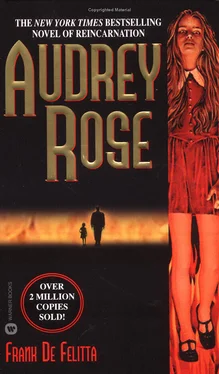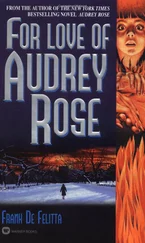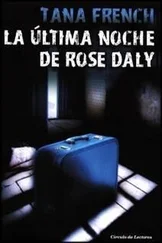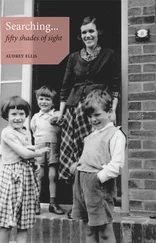For Janice, it was simply one more episode in the same seemingly endless nightmare. Quite often, as a day wore on, the softly uttered questions and answers would lose the character of speech, become a pleasant, mesmerizing drone, whisking her off into soothing thought-free dream states from which she often didn’t return till the hard sound of the gavel brought the day’s session to an end. They were a looked-forward-to-blessing, these happy flights from the stodgy and wearisome goings-on in Part Seven of the Criminal Courts Building in downtown Manhattan.
For the duration of the trial—five weeks at the outside, according to Scott Velie, the deputy district attorney in charge of the case—the Templeton routine was fixed and unchangeable. Weekday mornings at nine, arms linked in a show of mutual support and confidence, Bill and Janice would take their seats in the second row of the nearly empty courtroom and await Judge Langley’s appearance. The front row of seats was set aside for the press, only two of whom were ever present at one time. This morning, there was the man from United Press International and the elderly woman from the Long Island newspaper. On one occasion the woman had turned suddenly around in her seat and, in a sympathetic, motherly way, tried to question them about the case. Bill had simply ignored her, but Janice could not and had responded with the set speech they had been instructed to give to the press: “We have been asked not to discuss the case.” A few days later the woman reporter asked Janice how Ivy was faring at the school up in Westport, which startled her, since they had kept their daughter’s whereabouts a top secret. Still, Janice was able to smile and reply that Ivy was doing well and was happy, which was the truth. The school had been a success from the start. Janice could see this in the pink and healthy glow of her daughter’s face, in the bright and shining eyes that greeted them each Saturday morning upon their arrival. Best of all, the nightmares had stopped.
Bill had been forced into agreeing to the school in Westport since the district attorney had insisted that both parents be in court each and every day of the trial, but Janice knew he was unhappy about sending Ivy away even though they did not discuss it.
Ever since the night of the kidnapping she and Bill maintained a relationship that could, at best, be described as strained. Always polite, considerate of each other, they were like two strangers on a plane, forced to share each other’s company. Their conversation was limited and noncommittal, each saying no more to the other than was necessary to convey the basic substance of a question or answer.
Bill’s hatred of Hoover and his ambition to see him put away for the full count burgeoned with each passing day. Whenever Janice sought her own feelings about Hoover, a switch in her brain would click off the thought and veer her mind in other directions.
For weeks now, at precisely 9:04, Janice’s eyes would drift to the side door leading to the prisoner’s holding room and watch as Elliot Hoover was ushered into the courtroom by a uniformed guard, who always, she was constantly surprised to see, held Hoover tightly by the arm.
Janice would always shift her gaze away from Hoover as he was led to his seat at the defense table because once at the beginning of the proceedings Hoover had caught her looking at him and had returned a nod and smile in her direction. Bill, sitting beside her, had noticed, for Janice could feel his arm tense and his breathing rate escalate. She wondered what Hoover thought about during the long days in the courtroom and the even longer nights alone in his prison cell. He had not tried to communicate with her since his arrest. She had half expected he would and had steeled herself to repel any such attempts, but she was thankful he hadn’t tried. Looking back on their evening together, fraught with its odd commingling of terror and intimacy, she wondered if Hoover considered her a traitor.
As on every other morning, Brice Mack would rise at Hoover’s entrance, smile, and shake his client’s hand in an open display of affection and confidence. After which they would both sit and briefly confer. That is, Brice Mack would do the talking, while Hoover, betraying no emotion whatever, would sit imperturbably, a vast cathedral calm within him, pencil in hand, entering notations on a legal pad as his lawyer engaged in a clearly one-sided conversation. For two weeks Janice had watched, fascinated, as Elliot Hoover filled page upon page with notes during the course of jury selection and, remembering his diary, wondered what deeply felt thoughts and emotions he must be expressing on those yellow legal pages. Then, late one afternoon, after court had adjourned and Hoover had been ushered out of the courtroom, she purposely passed the defense’s table and glanced down at several pages he had left behind. They were filled with neat rows of nearly perfect circles.
“Do you believe in the resurrection of Christ?” Brice Mack gently queried the pretty blonde in the jury box.
“Well, I used to when I was a kid,” she responded with a vague smile.
Brice Mack wasn’t sure that her answer was entirely acceptable. He begged the court’s indulgence while he conferred with his client. Since no objection was registered by the prosecution, Judge Langley banged the gavel and declared a five-minute recess.
Brice Mack leaned across to Hoover, his arm draped loosely around his shoulder, and spoke in a hushed tone.
“We have one more challenge left. I’ll use it if you wish; however, I think this juror is going to be okay. What do you think?”
“Fine,” Hoover replied, “I have confidence in anyone you select.”
It had been this way between them from the first day they met. In Brice Mack’s mind, the luckiest day of his life.
He had been sitting in the courtroom of Judge Ira Parnell when he happened to glance up and notice a prisoner, flanked by two bailiffs, standing in the rear of the room, looking over at the section beyond the railing where he and several other lawyers were sitting. The prisoner seemed to be sizing them up. None of the other lawyers had noticed him, but Mack did. Their eyes met, whereupon the prisoner marched forward with his two bailiffs and, halting in front of Mack, said, “My name is Elliot Hoover. Will you be my lawyer? I can pay.” Although there had been no great ego satisfaction in having been picked at random, Mack welcomed a case where, for a change, somebody could afford to pay him and without hesitation said yes.
However, his first conversation with his new client sent a ripple of current dancing up and down his spine. For here was a case to sink one’s teeth into. This had angles. All kinds. Oblique, obtuse, bizarre, the stuff that galvanizes courtrooms, magnetizes the press, draws in the eyes and ears of the world.
Reincarnation? Hot damn! If the man wasn’t psycho and the court could be prevailed upon to accept the evidence as a competent defense, who knew where it could lead to, and where it might end?
During the first meeting with Hoover, Mack had tentatively offered his client the possibility of a defense based on temporary insanity. He felt it his duty as a lawyer to do so, but the notion, fortunately, was rejected by Hoover.
During subsequent meetings Brice Mack was filled in on all the events that occurred before, during, and after the abduction at 1 West Sixty-seventh Street, and each new disclosure was more delicious than the last. Mack was delighted to find Hoover a willing client who forthrightly maintained that he was simply trying to help Ivy Templeton and, through her, his deceased daughter, Audrey Rose, and who related substantial eyewitness testimony that his daughter’s soul was crying out to him through the vehicle of Ivy’s body for help and that in abducting Ivy, he was simply doing what any concerned father with the capability of helping his ailing child would do. On this point, Hoover made his position perfectly clear; he had the right to take Ivy, he felt, under the circumstances.
Читать дальше












